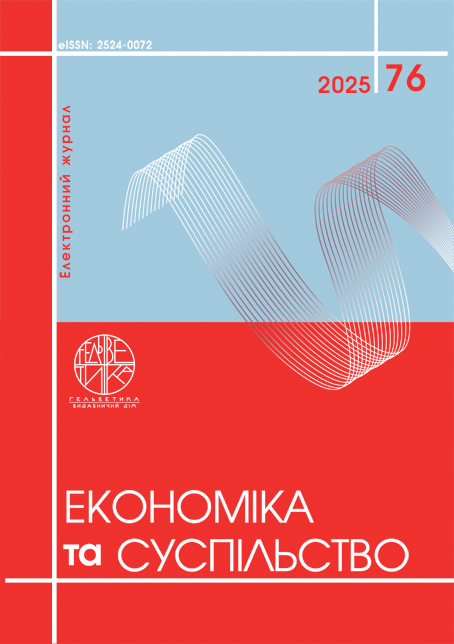ECOTOURISM ROUTES AS A DEVELOPMENT TOOL FOR RURAL COMMUNITIES
Abstract
This article explores the potential of ecotourism routes as a tool for the integrated and sustainable development of rural communities in Ukraine. As a form of responsible travel that prioritizes environmental protection, respect for local cultures, and socio-economic benefits for host populations, ecotourism offers viable opportunities for revitalizing economically marginalized rural areas. The study highlights that ecotourism routes, when designed and managed properly, not only attract environmentally conscious travelers but also foster entrepreneurship, stimulate the development of local infrastructure, and contribute to the diversification of rural economies. The article provides a conceptual analysis of ecotourism and ecotourism routes, with attention to their structural and operational characteristics. It reviews successful examples of ecotourism route development in Ukraine—particularly in the Carpathian region, Polissia, and Podillia—as well as international case studies from countries such as Slovenia and Lithuania. The research identifies common challenges faced by communities, including insufficient funding, lack of trained personnel, weak institutional support, inadequate transportation accessibility, and underdeveloped visitor services and marketing channels. In response to these challenges, the authors propose a set of actionable and context-sensitive recommendations, including community resource mapping, the development of integrated route concepts, the establishment of multi-stakeholder partnerships with non-governmental organizations, local governments, academic institutions, and private stakeholders, as well as programs for training local guides, artisans, and hospitality providers. Additionally, strategies for targeted online and offline marketing, environmental education, and visitor feedback mechanisms are outlined. Particular emphasis is placed on the need for participatory planning, inclusive governance, and public-private cooperation to ensure the long-term sustainability and resilience of rural tourism initiatives. The article argues that ecotourism routes can serve as platforms for community empowerment, environmental awareness, and the preservation of intangible cultural heritage. This study is highly relevant for policymakers, local authorities, tourism professionals, researchers, and civil society actors seeking to enhance the socio-economic viability, identity, and ecological stewardship of rural territories in Ukraine and beyond.
References
НПП «Сколівські Бескиди». Звіт з еколого-просвітницької діяльності національного природного парку «Сколівські Бескиди» за 2022 рік, 2022. 40 с.
Замула І. В., Кирилюк Д. Р. Розвиток екологічного туризму в Україні. Економіка, управління та адміністрування. 2023. № 2(104). С. 3–9. DOI: https://doi.org/10.26642/ema-2023-2(104)-3-9
Кифяк В.Ф. Організація туристичної діяльності в Україні. Чернівці : Книги-ХХІ, 2003. 300 с.
Любіцева О., Сташук К. Розвиток екологічного туризму в Україні. Економічна та соціальна географія. 2002. С. 190-196.
Любіцева О.О. Методика розробки турів. Навчальний посібник. Київ : Альтерпрес, 2003. 104 с.
Михайліченко Г.І. Практика організації туристичних подорожей: Навч. посіб. Київ : Київ. нац. торг.-екон. ун-т, 2003. 156 с.
Львівська область: природні умови та ресурси : монографія / за заг. ред. д-ра геогр. наук., проф. М. М. Назарука. Львів : Вид-во Старого Лева, 2018. 592 с.
Нікітенко К.В. Розвиток екотуризму в Україні: потенціал та проблеми. Таврійський науковий вісник. Серія: Економіка. 2023. № 15. С. 259–263.
Ceballos-Lascurain, H., The future of ecotourism, Mexico Journal, January. 1987. Р. 36.
Handbook on Post-War Reconstruction and Development Economics of Ukraine: Catalyzing Progress. Contributions to Economics. In: Cirella, G.T. (ed) Chapter: 16. Publisher: Springer Nature Switzerland, Cham. pp. 271-291.
United Nations. Transforming Our World: the 2030 Agenda for Sustainable Development. 2015. A/RES/70/1. URL: https://sdgs.un.org
NPP «Skolivski Beskydy». (2022). Zvit z ekoloho-prosvitnytskoi diialnosti natsionalnoho pryrodnoho parku «Skolivski Beskydy» za 2022 rik.. 40 p. (in Ukrainian)
Zamula I. V., Kyryliuk D. R. (2023). Rozvytok ekolohichnoho turyzmu v Ukraini [Development of ecological tourism in Ukraine]. Economics, management and administration Vol. 2(104). Pp. 3–9. DOI: https://doi.org/10.26642/ema-2023-2(104)-3-9 (in Ukrainian)
Kyfiak V.F. (2003). Orhanizatsiia turystychnoi diialnosti v Ukraini. Monohrafiia [Organization of tourism activities in Ukraine: monograph] Chernivtsi: Knyhy-XXI. 300 p. (in Ukrainian)
Liubitseva O., Stashuk K. (2002). Rozvytok ekolohichnoho turyzmu v Ukraini [Development of ecological tourism in Ukraine]. Ekonomichna ta sotsialna heohrafiia. Kyiv. Pp. 190-196. (in Ukrainian)
Liubitseva O.O. (2003). Metodyka rozrobky turiv. Navchalnyi posibnyk [Tour development methodology: study guide]. Kyiv. Alterpres. 104 p. (in Ukrainian)
Mykhailichenko H.I. (2003). Praktyka orhanizatsii turystychnykh podorozhei: Navch. posib. [Practice of organizing tourist trips: study guide]. Kyiv. nats. torh.-ekon. un-t. 156 p. (in Ukrainian)
Nazaruk M.M. (ed). (2018). Lvivska oblast: pryrodni umovy ta resursy: monohrafiia [Lviv region: natural conditions and resources: monograph]. Lviv. Vyd-vo Staroho Leva. 592 p. (in Ukrainian)
Nikitenko K.V. (2023). Rozvytok ekoturyzmu v Ukraini: potentsial ta problemy [Development of ecological tourism in Ukraine: potential and problems]. Tavriiskyi naukovyi visnyk. Seriia: Ekonomika, (15). pp. 259–263. (in Ukrainian)
Ceballos-Lascurain, H., (1987). The future of ecotourism, Mexico Journal, January. Р. 36.
Handbook on Post-War Reconstruction and Development Economics of Ukraine: Catalyzing Progress. Contributions to Economics. In: Cirella G.T. (2008). Chapter: 16. Publisher: Springer Nature Switzerland, Cham. pp. 271-291.
United Nations. Transforming Our World: the 2030 Agenda for Sustainable Development. (2015). A/RES/70/1. Available at: https://sdgs.un.org
Copyright (c) 2025 Оксана Терлецька

This work is licensed under a Creative Commons Attribution 4.0 International License.


